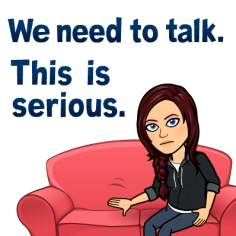 So the other day I happened to mention to a friend I had been feeling very tired this week. She responded by saying “You know what you should do?” and then proceeded to answer her own question. At length. She suggested changes to my diet, daily routine, use of essential oils, and shoes. Essentially, she told me that the answer to my temporary state of fatigue was to do everything just like she does. While I appreciated the desire to help, I walked away from the conversation feeling more like a toddler who hadn’t quite mastered the complexities of…functioning.
So the other day I happened to mention to a friend I had been feeling very tired this week. She responded by saying “You know what you should do?” and then proceeded to answer her own question. At length. She suggested changes to my diet, daily routine, use of essential oils, and shoes. Essentially, she told me that the answer to my temporary state of fatigue was to do everything just like she does. While I appreciated the desire to help, I walked away from the conversation feeling more like a toddler who hadn’t quite mastered the complexities of…functioning.
It’s fairly common for us to have a desire to help other people solve their problems and live better lives. I can totally relate to that, as a fair number of my blog posts are suggestions along that vein. However, I also realize that if you’re not interested in my particular suggestions, you’re under no obligation to keep reading them. In conversation, things work a little differently. This led me to start thinking about when we should and should not give in to the urge to problem solve. So I’m suggesting there are some things we should consider before dispensing even the most well-meaning advice.
Has someone actually asked for your advice?
Be very careful about unsolicited advice. Not everyone wants to hear your opinion on something. Sometimes people are just venting or making a casual comment. If you’re not careful, you can really put someone’s back up and create a negative impression, even if you’re just trying to help.
 If you’re thinking of offering advice unasked you need to stop and honestly assess your own mindset. Is your advice coming from a place of concern? Are you really worried about how the other person is doing and/or earnestly thinking about their best interest? In general, I avoid completely unsolicited advice, except in cases where I feel that someone is legitimately harming themselves. For example, I have spoken to friends about their drinking, drug use, and unhealthy relationships because in those instances I have felt that not saying something would be bad friendship. Outside of those instances, however, I’m very careful about making suggestions without being asked.
If you’re thinking of offering advice unasked you need to stop and honestly assess your own mindset. Is your advice coming from a place of concern? Are you really worried about how the other person is doing and/or earnestly thinking about their best interest? In general, I avoid completely unsolicited advice, except in cases where I feel that someone is legitimately harming themselves. For example, I have spoken to friends about their drinking, drug use, and unhealthy relationships because in those instances I have felt that not saying something would be bad friendship. Outside of those instances, however, I’m very careful about making suggestions without being asked.
One thing to really be careful about is advice coming from a feeling of superiority. This happens when you assume your way of doing something is best for the entire world. Maybe you have lost twenty pounds on the keto diet, and maybe I wouldn’t mind losing twenty pounds (and I’ll admit I should lose at least ten). The thing is, I like bread. A lot.
 We all have a tendency to think our way is the “right way” (I think it might be hardwired into our brains), but odds are that the person you’re talking to has their own “right way” and probably is going to see you as preachy instead of helpful. In other words, you need to at least wait for the subject to come up before telling someone about your diet, exercise regime, parenting style, etc. (Especially the diet. Seriously. I’ve had people tell me out of the blue how I could lose weight, and I’m still amazed I didn’t punch them.)
We all have a tendency to think our way is the “right way” (I think it might be hardwired into our brains), but odds are that the person you’re talking to has their own “right way” and probably is going to see you as preachy instead of helpful. In other words, you need to at least wait for the subject to come up before telling someone about your diet, exercise regime, parenting style, etc. (Especially the diet. Seriously. I’ve had people tell me out of the blue how I could lose weight, and I’m still amazed I didn’t punch them.)
Of course, where things get a little tricky are when someone has been telling you about a problem they have been having. Then you might assume advice is what they’re looking for, and if you have it, you want to share it. Especially if you genuinely care about this person and want to see things improve for them. The funny things is, though, that solutions might not be what they want. Sometimes, all someone needs to do is vent and the situation has already improved, or they might not be ready to actually do something about it or to listen to possible solutions (especially if it’s a solution they don’t necessarily like). Personally, when I was ready to lose weight, change jobs, buy a house, etc., I was all about getting advice from other people, but until I was at that point I didn’t want to hear it. The best thing to do is to simply ask “Do you want my advice?” or “Do you want to know what I think?”
If you’re talking to someone that you have an established relationship with, you should also think about how they’ve reacted to your suggestions in the past. Case in point: I had a roommate who hated her job. Every single day, she would come home complaining about, well, typically the same things over and over again. Any time I asked if she wanted advice, she said yes. So we would talk about how to change things, approach situations differently, and improve both her competence and her comfort. Sometimes, we made entire plans to organize her schedule and roleplayed different ways to approach difficult coworkers.
The problem was that she never actually did any of these things, and continuously came home with the same complaints. This started to frustrate me to no end. What I finally had to realize was this was a case of actions speaking louder than words. Maybe she asked for my advice to be polite, or maybe she was on board in the moment but decided later on it was too much effort. Either way, I eventually realized I needed to stop asking, let her vent, and then move on to what we were doing for dinner.
So what if they have asked?
 So if someone genuinely wants your opinion you should definitely offer it, but you still need to think through how you’re doing that. It’s very easy to blur the line between advice and criticism. Advice focuses on “here’s how you can solve a problem or do something better”. When you start to veer into the territory of “here’s what you’re doing wrong”, you need to tread very carefully. Criticizing is the easiest way to get someone to shut down, ignore your suggestions, and feel negative towards you.
So if someone genuinely wants your opinion you should definitely offer it, but you still need to think through how you’re doing that. It’s very easy to blur the line between advice and criticism. Advice focuses on “here’s how you can solve a problem or do something better”. When you start to veer into the territory of “here’s what you’re doing wrong”, you need to tread very carefully. Criticizing is the easiest way to get someone to shut down, ignore your suggestions, and feel negative towards you.
Focus on being kind and constructive, especially when you need to point out where someone has misstepped or self-sabotaged. Most of what you say should be focused on moving forward, not analyzing previous mistakes.
 You also want to avoid trying to deal with too many things at once. It will overwhelm the other person and make them less likely to try anything you’re suggesting. In general, it’s always best to suggest just two or three steps someone can take, because that seems manageable and is much more likely to lead to follow through. In my first management position, I made the mistake of giving an employee a list of ten actions and improvement items in one performance review. It completely paralyzed her, convinced her that her job was in jeopardy, and caused her to make absolutely no changes. My supervisor pointed out where I had gone wrong, and when I cut that list down to three current priorities (and apologized for freaking her out) there was progress. Eventually, we got through all ten.
You also want to avoid trying to deal with too many things at once. It will overwhelm the other person and make them less likely to try anything you’re suggesting. In general, it’s always best to suggest just two or three steps someone can take, because that seems manageable and is much more likely to lead to follow through. In my first management position, I made the mistake of giving an employee a list of ten actions and improvement items in one performance review. It completely paralyzed her, convinced her that her job was in jeopardy, and caused her to make absolutely no changes. My supervisor pointed out where I had gone wrong, and when I cut that list down to three current priorities (and apologized for freaking her out) there was progress. Eventually, we got through all ten.

What are some of your experiences with giving or receiving advice?

Absolutely love this. I feel you.
LikeLiked by 3 people
Thank you. 🙂
LikeLiked by 1 person
A very thoughtful post. One that all of us have been guilty of at one time or another. In many cases, the person lamenting or complaining is simply looking for someone to listen. Often, the best response is “Let Me Know if there is anything I can do to help.” Even that one can be fraught with danger, as people can become dependant and drag you down. We just went through a major period where we thought we could fix everyone else’s problems and in fact it darn near dragged us down. This finally let us see that not everyone can be or wants to be rescued. Sometimes while you struggle to rescue others, you drown. We now offer advice, only when requested. Happy Easter Amanda. Allan
LikeLiked by 2 people
I’ve definitely learned to pay attention to what someone does with help and advice, and that influences how I respond the next time. Happy Easter to you, too.
LikeLiked by 2 people
When I was in shrink school, we were taught to very rarely give people direct advice. Instead, we were told that just by listening intently and reflecting our understanding of the other person’s words back at them, that we can help them find their own solutions. Part of that comes from the ethical/philosophical positions of shrinkism (psychology and counseling) though, which tend to favor allowing people as much autonomy as is safe for them.
LikeLiked by 3 people
Definitely. You always need to stop and think before suggesting a course of action.
LikeLiked by 1 person
People ask me for advice from time to time. Sometimes I answer in the form of a Buddhist sutra. But they still come back for more…
LikeLiked by 2 people
I’m not sure how to respond to that. Lol
LikeLiked by 1 person
That response was perfectly fine!
LikeLiked by 1 person
Great post, I’ve been on both sides, receiving unsolicited advice and also giving unwanted advice. I’ve lost a friendship over it, she felt judged although I intended to offer support. Ive gotten better with that but “the road to hell is paved with good intentions”! I think your suggestion to ask if they want your opinion is good, and you’re right, they’ll either try the advice or ignore it. Now I usually just try to listen, let them vent, and I share experiences that I think were similar along with asking questions so they end up answering their own “question”.
LikeLiked by 2 people
I’m a fixer by nature, so I’ve had to learn to carefully read the situation, ask questions, and err on the side of caution. Being on the receiving end of unsolicited (and, on occasion, borderline offensive) advice definitely helped me reevaluate my approach.
LikeLiked by 1 person
Yes, even strangers have offered advice, or commented on my body (once a stranger out of the blue, said I shouldn’t let any man suggest that I lose weight, as if he was supportive of my size)! It’s so strange how people think they’re being helpful! 🙄
LikeLiked by 1 person
Good advice for me, Amanda. Yes, I’m a fixer also.
LikeLiked by 1 person
Being happy to help when help is wanted is, I think, a great policy.
LikeLiked by 1 person
I don’t ever give advice unless they ask for it. I think this backfires because I swear they all come to me for advice! Although I am happy to help I get so tired of everyone’s drama…lol
LikeLiked by 1 person
You know what irks me – when they come for advice, then not only won’t they listen, or are not receptive to it. Which is ok. Till they accuse you after that of not taking their welfare into consideration.
LikeLiked by 1 person
I get people looking for advice and people looking to vent. I always have to be very aware to be sure of which one it is.
LikeLiked by 1 person
Great post! I find the absolute worst case is giving relationship advice. Telling somebody to leave their partner can be catastrophic for a friendship if the couple make up (or maybe even if they don’t and then you could get blamed for this)… I reckon the least advice you give, the better off you are. Talking things through and exploring options together is priceless though and an important part of a lot of friendships.
Really interesting point about giving your colleague 10 things to change which overwhelmed and paralysed her. I like the number three 🙂
Thanks for the read 🙂 🙂 🙂
LikeLiked by 2 people
I almost never give relationship advice, because I’ve been single for the majority of my life. I can give decent first date advice. Lol
LikeLiked by 1 person
I’ve been in a relationship most of my life but that certainly doesn’t mean I’m an authority on relationships – oh no! 🙂
LikeLiked by 1 person
I think this is a really good post! There’s nothing worse than unwanted advice.
I think we’re becoming more hard-wired to need to say something. It’s what we want to do – especially on social media. We ssay something and become part of the conversation. We want to have something to add, even if the thing we’re adding isn’t completely relevant! We’re part of the conversation, but we sometimes lose sight of whether we’re actually helping and adding value.
The other thing is that when people are talking and giving advice, they’re not listening. Sometimes the first person doesn’t even get to finish explaining what a problem is before someone else makes the whole conversation about them again, and how they solved that particular problem!
Some great tips – thanks for sharing.
LikeLiked by 2 people
Listening is so important, and you’re right…it does seem like it’s starting to become something of a lost art.
LikeLike
Life is like a smorgasbord what works for one person is not going to work for someone else. Life is about choices that fit your life. It is not a one size fits all. Thanks for sharing.
LikeLiked by 2 people
Well said. ☺
LikeLike
Thank you.
LikeLiked by 1 person
This post is quite relevant in recent times. Where we get bombarded with unsolicited advice and opinions. I really like the way you have presented this topic. Great post !
LikeLiked by 2 people
Thank you so much!
LikeLike
Very good thoughts. When I give advice, I like to state my thoughts and that this is what worked for me though I understand it may not for them. Or I share something I’ve recently read but not try and I share that I read it and would be happy to share it.
LikeLiked by 2 people
That’s a great approach.
LikeLiked by 1 person
Nice article…even i feel the same but putting all these thoughts collectively is really great..but on the other note i love to give advice to other people as i think i am a genius
LikeLiked by 2 people
It’s funny how often the solution to other people’s problems seems much simpler than the solution to our own.
LikeLiked by 1 person
Actually solution to every problem is always very simple…its only us who make it complicated..
LikeLiked by 1 person
😜😜
LikeLike
Some people want change without changing anything.
LikeLiked by 1 person
Have avoided giving advice to my adult children unless a particular course or choice of theirs is headed for disaster. I used to get so angry as when I’ve counselled against bad choices it turned out horribly just as I predicted yet they still won’t listen. I have no control so I back off. More frequently in recent times, however, they have asked for advice. So I’ve decided to remain available if it is asked.
LikeLiked by 2 people
Sounds like you’ve found the right approach for all of you.
LikeLike
Hi…i had nominated you for the sunshine blogger award…do check😊
LikeLiked by 1 person